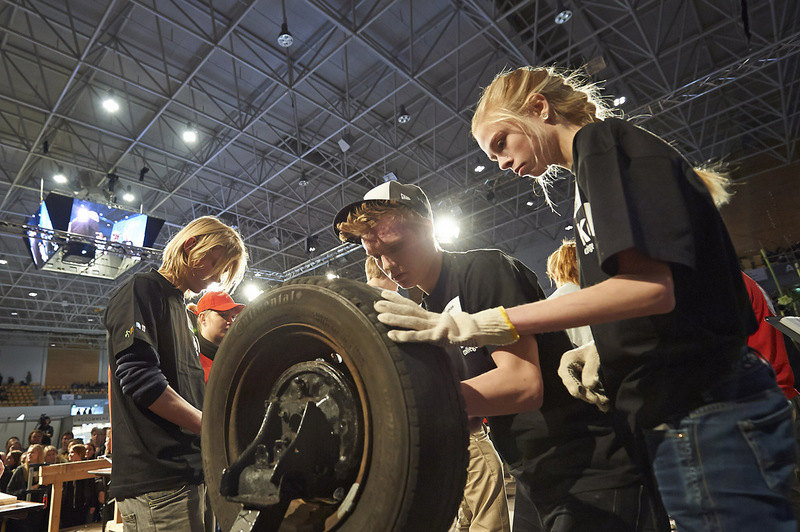Competing In Competences
Year/Date: 06/06/2013

This article appeared first in the ETF's magazine Live&Learn.
A 13% jump in applications from one year to the next would be a dream scenario for any vocational school. But this is the reality for Aarhus Tech in 2013 and it gives much of the credit to the Danish national skills competition that Aarhus hosted in January. The event introduced tens of thousands of young Danes to VET as an alternative to the much more popular general secondary education streams. Such an instant local response suggests that skills competitions have considerable potential as tools for boosting the image of VET.
The origins of skills competitions
The idea of competing in competences was conceived in Spain in the 1940s in response to a desperate need for skilled workers. It caught on internationally. Already in the 1950s the first international skills competitions were organised and today World Skills is a huge and prestigious biennial event. Central European countries compete intensely in crafts. South Korean students are released from military service if they take home a gold medal. Now, Russia is gearing up to participate in World Skills for the first time in Leipzig in 2013.
Finland has successfully exploited the potential of skill competitions in recent years. Its national events attract huge crowds and have helped to boost enrolment in VET from one-third of the relevant age group to 50% over the past two decades.
Before joining the ETF, Petri Lempinen was involved in both national competitions in Finland and in hosting the 2005 World Skills competition in Helsinki.
Not just show biz
“It’s not just show business,” said Lempinen. “There are very real benefits besides the increase in VET enrolment. Our competitions create opportunities for schools to work together in local and regional preparations. They also offer kids specific examples of the use of vocational skills.”
Many of the young visitors in Aarhus seemed to agree. “It is nice to have so many different things in one space,” said 15-year-old ninth grader Line Pedersen. “Our normal internships show you only one profession that you often knew to begin with.”
Pedersen has also visited education fairs, but she thinks that the competition is better. “At fairs I always feel as if they are trying to sell me something. Here you can see more kids of your own age and talk to them.”
“We cannot all sit on our chairs and be little Einsteins. We need young people with hands as well as brains.”
Birger Lomholt, a teacher at Herningsholm Erhvervsskole, accompanying the competitors in civil construction.
Ulla Groth of Danske Erhvervsskoler, one of the driving forces behind Skills Denmark, knows from experience that the experience from Aarhus is not unique. “The first time we organised Skills Denmark in Odense, we saw increases of up to 10% in the city and 5% slightly further out. More importantly, this intake was sustained the following year.”
ETF partner countries in skills competitions
While promoting VET is an important reason for Russia to enter World Skills, it is not the only one. Pavel Chernykh of World Skills Russia says that benchmarking is equally important.
“As Russia increasingly engages in an internationally competitive market, we need to review our professional standards,” said Chernykh. “World Skills provides a unique means of exchange and comparison of world-class competence standards in industrial trades and services.”
Participation in World Skills challenges every aspect of education and training and the effect reaches remarkably deep into the systems of participating countries: qualification rounds start at schools and in regional contests and confront the participants with different demands for skills than they may be accustomed to.
“Take the example of mechatronics,” said Chernykh. “In World Skills it does not cover exactly the same content as it does in Russia. We do not necessarily need to change it, but this forces us to think about why we do things the way we do them and that is good. It also forces schools to talk about these things with each other and with industrial partners. This is good too.”
When it comes to addressing some of the classic problems in VET in ETF partner countries, skills competitions can kill quite a few birds with the one stone. They can raise the profile of VET, adding an element of excitement to a field that is often considered void of such. They are a powerful tool for stimulating cooperation, both between schools and between schools and labour market partners. And they can play a role in career guidance, helping young people to make informed choices about their futures.
Showcase for rare skills
Skills competitions can serve as a useful shop window for niche professions. In Aarhus, one of the best examples of this could be found at the far end of the most remote hall: the thatchers.
“We’re a bunch of old people that desperately need new blood,” said Per Keis, who has spearheaded Danish efforts to promote education for young thatchers. He is proud of his three students and they are proud of their choice. “We’re all a bit nuts,” said Eskil Duus, one of the three students. “I used to play New Orleans jazz. One of my fellow students came straight from a pub. But we think of ourselves as artists. It’s a unique profession where you need both your brains and your hands.”
For the likes of the thatchers, who need a few students per year in an entire country, participating in fairs is far too expensive. The skills competition gives them the exposure they otherwise would have lacked.
Text: Ard Jongsma, ICE
Источник: http://www.etf.europa.eu/web.nsf/pages/Competing_i...
Views: 1708